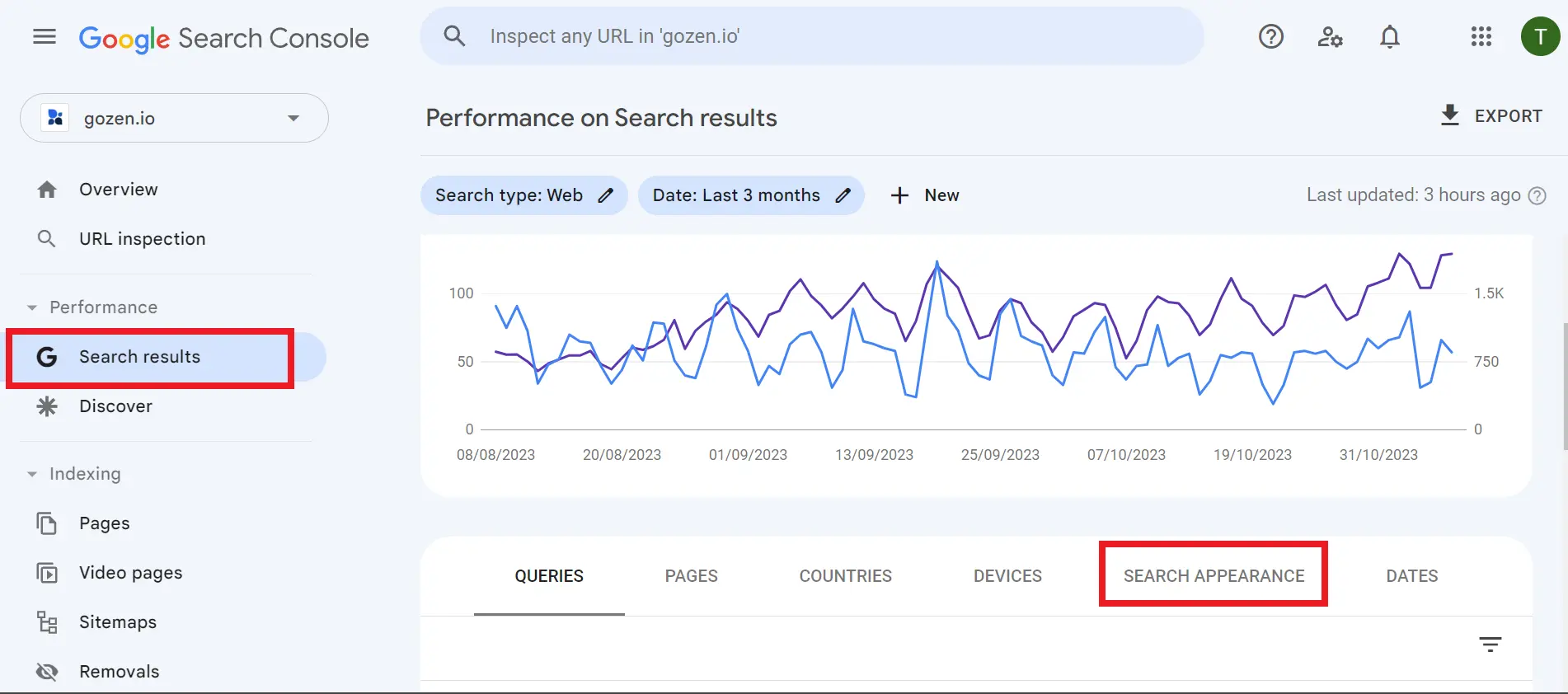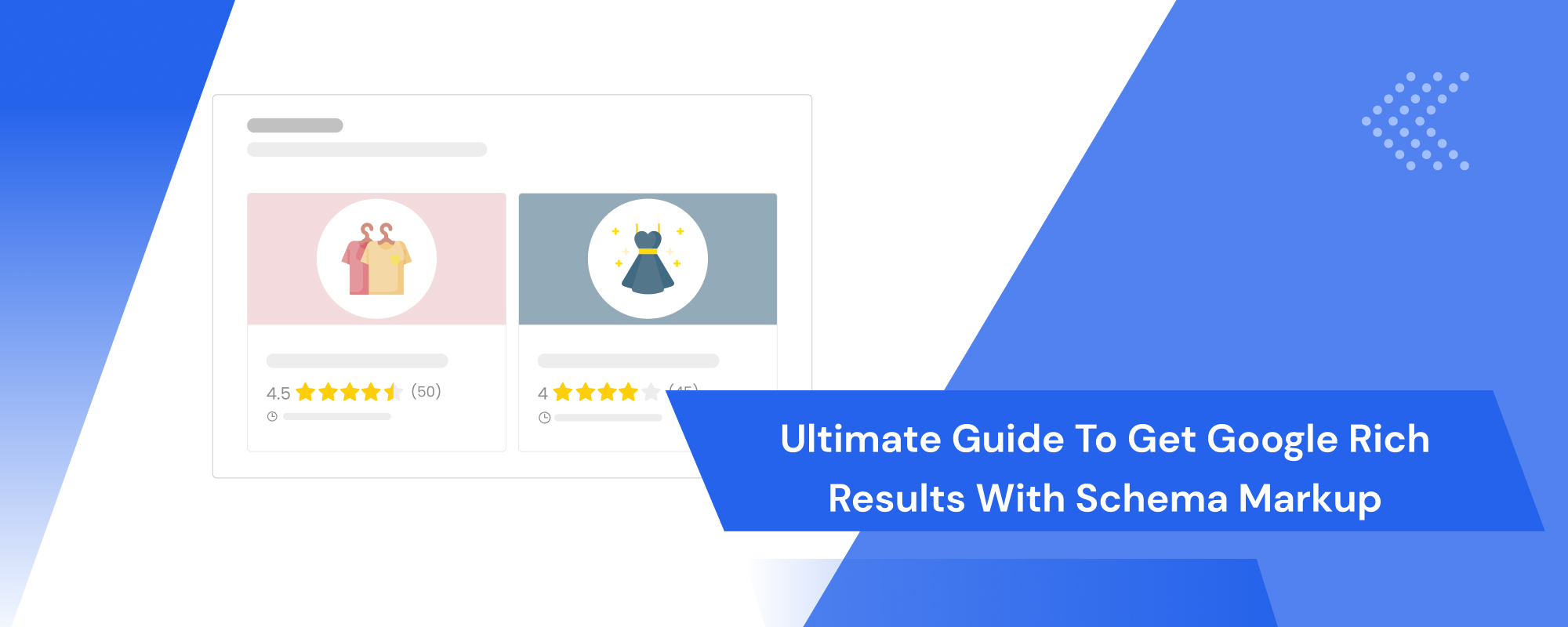Securing a prominent position on Google search engine results page (SERP) is challenging in the evolving pace of SEO. As the SEO continues to evolve, so do the strategies employed to enhance a website’s visibility and user engagement.
One such strategy is schema markup—an invaluable technique that not only communicates with search engines but also unlocks the potential for Google Rich Results.
To get a rich appearance for your content in SERPs, it’s essential to incorporate schema markup, also referred to as structured data into your website.
This is particularly important if your website belongs to any of the following categories:
Table of Content
Why Choose Content.AI for Schema Markup/ Structured Data Generation?
How to Use Content.AI for Schema Markup/ Structured Data Generation?
What is Google Rich Results?
Google Rich Results, also known as rich snippets, is an SEO practice that aims to provide users with a visually appealing informative experience on search engine results pages (SERPs).
The Google Rich Results are more than standard text snippets, that include additional elements, such as images, review stats, pricing information, company details, and more. Achieving Google rich results requires optimizing the website by implementing structured data.
The following section will delve into an explanation of what structured data is.
Here’s are some examples of Google Rich Results:
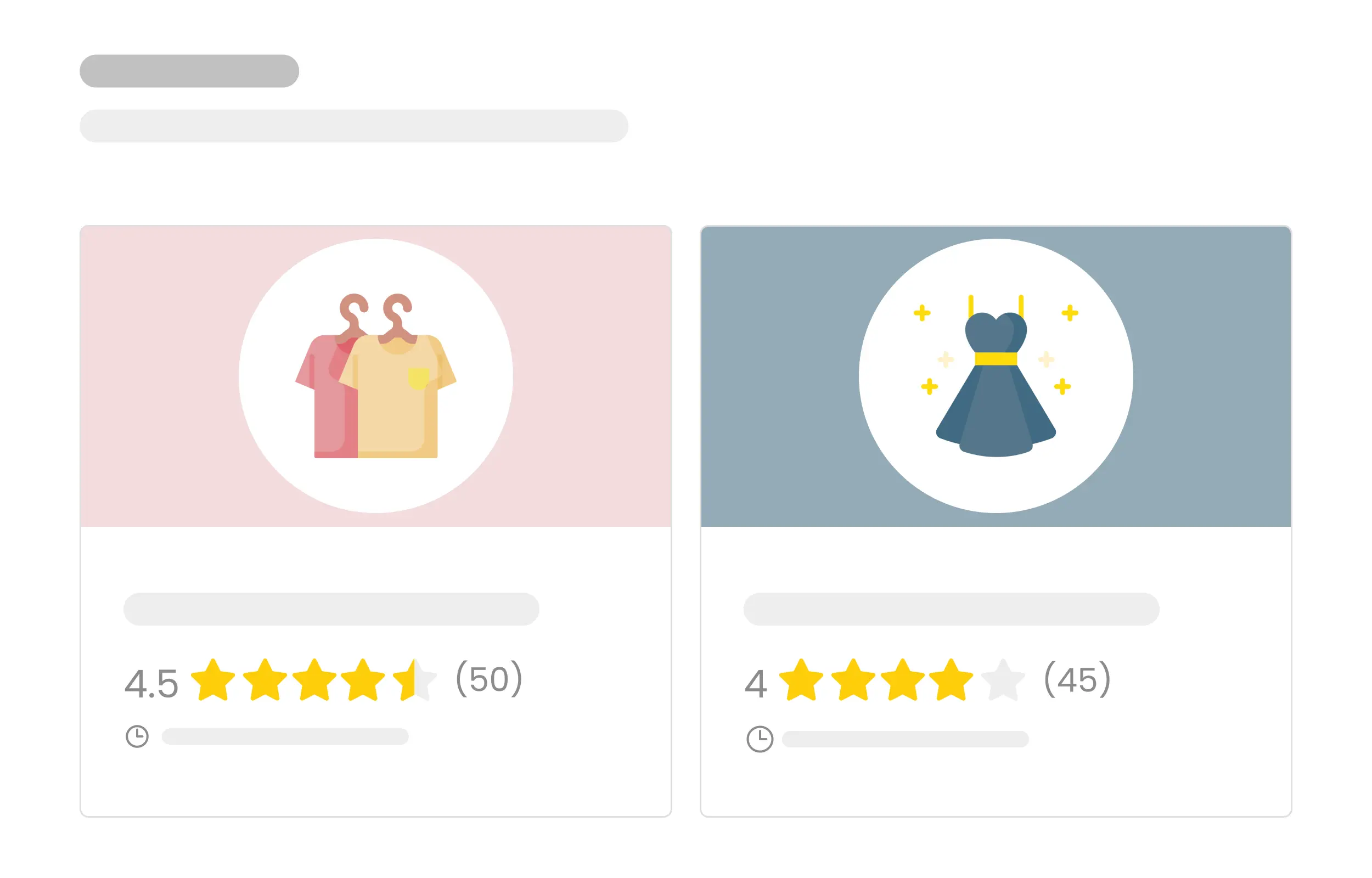
Carousel rich results
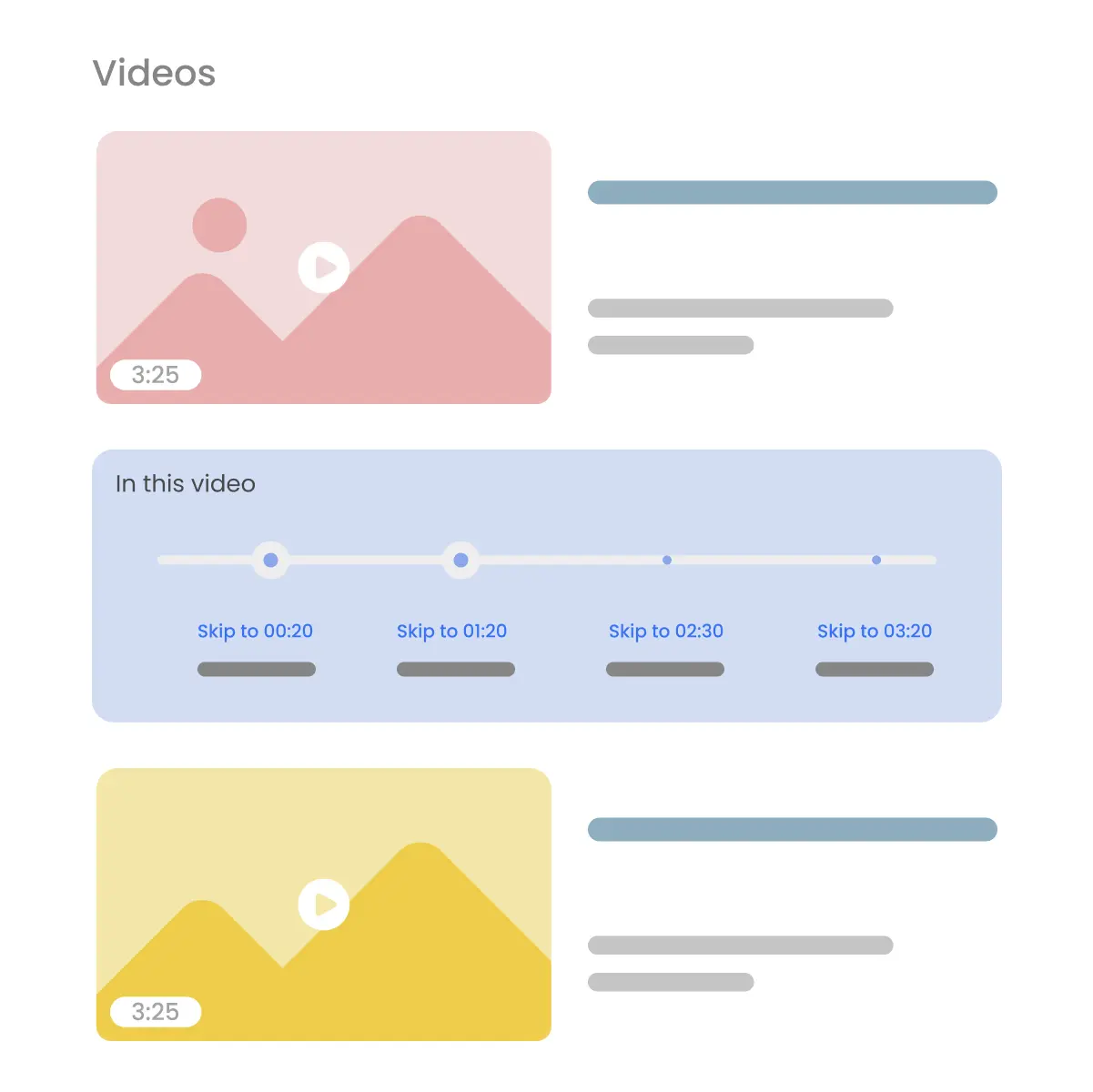
Videos rich results

Software app rich results
Google supports 30 types of rich results for various fields, which are:
E-commerce: book actions, product, review snippet
Organizations: home activity, local business, Logo, aka Google knowledge panel, review snippet
Sports: articles, video
Jobs: employer aggregate rating, estimated salary, job posting, Logo, aka Google knowledge panel
Entertainment: book actions, event, movie, review snippet
News: article, fact check, speakable, subscription and paywalled content, video
Food and drink: carousel, recipe, review snippet, video
Education and science: book actions, carousel, course list, dataset, education Q&A, home activity, learning video, math solver, practice problem, video
To get the visuals of all of these rich results, visit the Google Search Central page.
Apart from these types, Google also supports “Enriched search results”, a subset of rich results. Enriched search results are a more interactive form of rich results that allows users to perform searches across multiple properties of structured data.
Enriched search results can also be implemented using the structured data markup, also known as, schema markup. In addition to this, a website must follow the Google enriched guidelines to be eligible for it.
Importance of Google Rich Results
Enhanced visibility and click-through rate (CTR): Since Google Rich Results stand out on the SERPs, it can effortlessly attract user’s attention with its visually appealing snippets.
This enhanced visibility not only attracts user attention but translates into higher click-through rates.
Improved User Engagement and Trust: The Rich Results eliminated a lot of friction for users, such as visiting the website and juggling between the review and pricing pages to get the details of a particular product or service they are looking for.
Providing all the essential details of your product and service in a snapshot creates a more engaging and user-friendly experience.
Also, the Rich Results instill a form of trust in the user’s mind about your brand with its authoritative appearance.
Competitive Edge in SERPs: There is no explanation needed to explain digital competitiveness. To differentiate yourself from your competitors and dominate the SERPs, you must sync with the trend.
As discussed in the previous point, Rich Results possesses the qualities of trust and authoritativeness. Hence, you will get more click rates than your competitors who have yet to optimize their websites for structured data.
Diverse Content Types and Diverse Opportunities: To dominate the SERPs, your valuable content alone is not enough.
Let’s assume you have an e-commerce website that sells baby clothes and one of your articles ranks for the keyword “toddler girl clothes” among the top 10 articles of SERP.
Apart from this, consider your toddler’s clothes also appeared in Google Rich Results with essential details, such as reviews and price.
In this example, your e-commerce website increased the winning probability two times.
This is how you should play the SEO game.
Rich Snippet Testing Tool
Now that you know what is Google Rich Results and its importance, let’s move on to how to find whether your website is optimized for these rich results.
To check whether your website is optimized for rich results, you need to check with Google’s Rich Results testing tool.
The Google’s Rich Results tool identifies whether the given URL supports rich results by examining the structured data implementation. If there is no structured data implementation, your website will not be eligible for rich results.
To determine if your webpage is eligible for Google Rich Results:
You can see the screenshot below in which the tool detected the “Logos” Rich Snippet for our GoZen’s homepage URL.
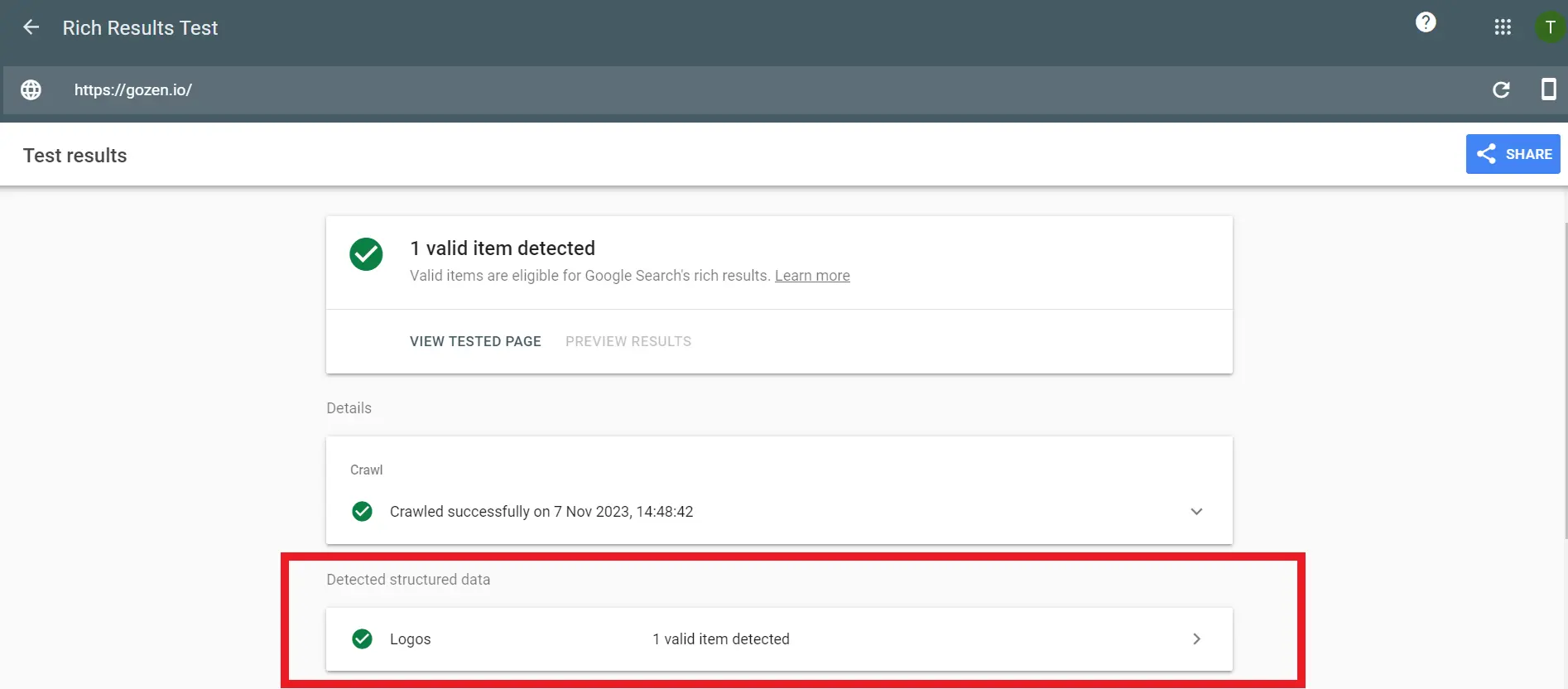
What is Schema Markup?
Schema Markup or structured data markup is a form of defining metadata using any one of the globalized standard markups like JSON-LD, microdata, or RDFa.
Here the metadata is structured data that uses standardized formats and tags to present data in a structured manner that is easily understandable by search engines.
These standards for structured data schema are established and overseen by Schema.org, a collaborative community founded by Google, Microsoft, Yahoo, and Yandex.
Fundamentally, metadata is data about data. In this case, structured data gives additional information about the content of a webpage.
Using Schema Markup for structured data helps search engines understand the webpage content better, leading to richer results. Remember, not all metadata can be structured data.
To validate a website’s structured data, head to the schema validator tool by Schema.org, enter the URL, and run the test.
Types of Schema Markup?
Not all web pages of a website can have the same structured data. For example, the homepage of a website has “Organization” structured data and the blog pages will have “Article” structured data.
Types of schema markup or structured data:
How to Add Structured Data to WordPress, Wix, Shopify, and React Websites?
By now, you must have better understanding of structured data which leads to rich results. Adding structured data to any website is an easy task and can be done in a few minutes.
Before creating structured data for your website, decide in which format you are going to implement it. Google supports and comprehends structured data written in any of the following three formats: JSON-LD, microdata, or RDFa. However, Google recommends structured data in JSON-LD format since it is easy to implement.
There are many tools available for schema markup/ structured data markup. Here I have listed a few tools, by using these you can create structured data in all three formats.
Free and freemium Structured Data Generator Tools:
I prefer to use Content.AI and Merkle for our schema generator tools.
Why Choose Content.AI for Schema Markup/ Structured Data Generation?
How to Use Content.AI for Schema Markup/ Structured Data Generation?
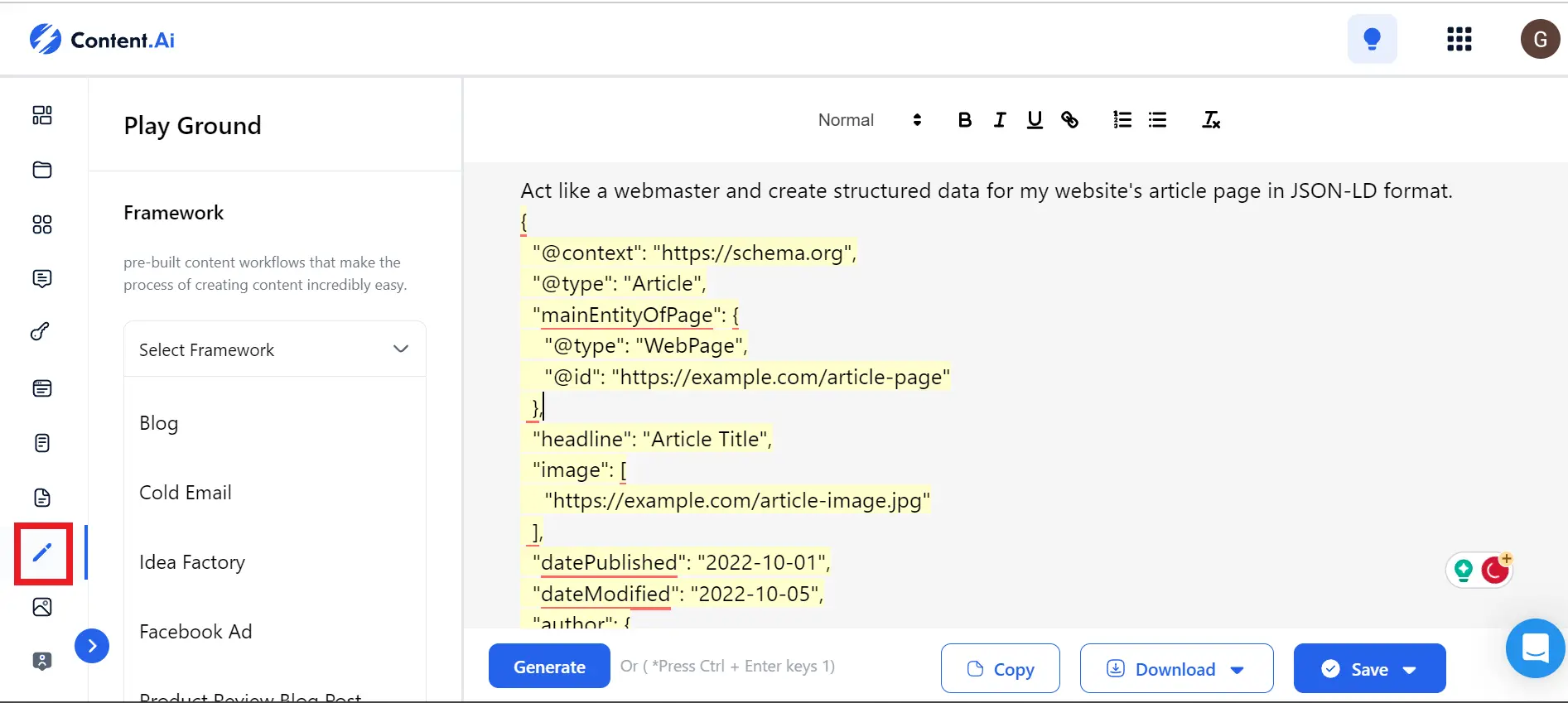
Once you have created structured data using any one of these tools, you can copy-paste it into your website with the help of your webmaster.
In case you are using third-party CMS, such as WordPress, Wix, or Shopify, head to the “search engine settings page” and paste it. In the absence of the search engine settings page, you can implement structured data via plugins.
Google on How-To and FAQ Rich Results
To make the search experience more clean and authentic, Google phased out the How-To and FAQ-rich results on September 13, 2023.
Going forward, the FAQ-rich results will only be shown for authoritative government and health websites. This act of Google drastically will improve the quality and trust of the information on the web.
Likewise, the How-To structured data will only be shown for desktop users and not for mobile devices.
Should you remove the How-To and FAQ structured data markups from your website?
No, there is no need to actively remove the How-To and FAQ structured data schema markups as they do not pose any SEO-related issues. Additionally, other search engines may have utilized these structured data elements.
What’s New on Structured Data?
Recently, Google announced a new way of communication called “Syntax Graph Merge”. The Syntax Graph Merge allows websites to have multiple formats of structured data markups. For example, one page of a website can be in JSON-LD and the other page could be in Microdata format.
Concurrent with the cessation of how-to and FAQ-rich results, Google introduced structured data support for vehicle listings in their documentation. However, it may take a while for this new vehicle listing feature to be updated in the Google structured markup helper.
Conclusion
Implementing structured data to your website will not improve your ranking on SERPs. John Mueller, a search advocate of Google, made a clear statement about structured data and SEO rankings.
So, why should I implement it? You may ask.
To
FAQs
1. Does schema for a website matter for SEO?
Schema markup or structured data markup for a website is not directly related to SEO ranking factors. However, having it may drastically increase the CTR since structured data markup leads to visually appealing rich results.
2. Can I do the rich results test on the Google Search Console?
Yes, you can monitor your statistics for rich results in the Google Search Console itself. To do so:
